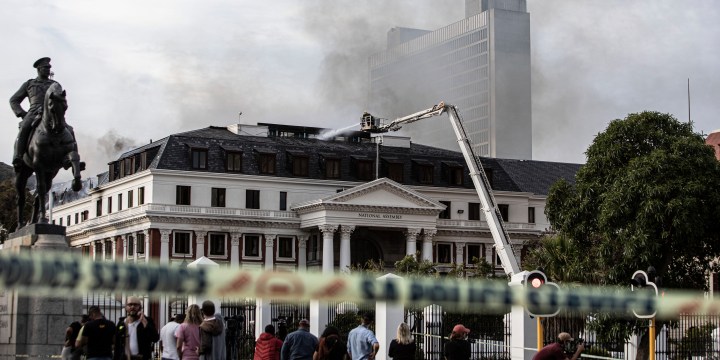POST-ELECTION SCENARIOS
Parliament may see a shake-up in 2024 after inclusion of independents, but will the political culture change?

Coalitions and independent MPs joining the House could introduce a breath of fresh air after a year of same-old, same-old.
When Parliament returns after the 2024 elections, it will be a changed institution with the inclusion of independent lawmakers – even if just one or two independents make it past the electoral administrative bump and South Africa’s party-dominated political culture.
Independents would be a shake-up. For the first time in 30 years of South Africa’s constitutional democracy, a member of Parliament may not be beholden to a political party for a seat. That may take some getting used to.
The presence of independents will reshuffle the parliamentary system of calculating committee membership should an independent MP be part of the two seats traditionally reserved for sharing among smaller minority parties, or claim their own seat(s).
Ditto, speaking time in the House. Would an independent get the same plentiful time as a political party leader – in essence that’s what an independent could be regarded as, given that they represent a province – or would it be the few minutes allocated to one of the one-seat political parties?
If pundits are proven right that the ANC drops below 50% of voter support, alongside independents, coalitions may also shake up parliamentary comfort zones.
Snappy coalition-making must unfold once the 2024 election result is proclaimed by the Electoral Commission of South Africa. The 14-day constitutional window means that by the time MPs are sworn in, coalition deals must be done. First order after the swearing-in at the first sitting is the election of South Africa’s president, according to Section 86 of the Constitution.
Independents, coalitions – it’s unprecedented. But all this will play out only after the ballots are cast. More certain is the new Parliament’s legislative programme. It will have to revive bills in either the National Assembly or the National Council of Provinces (NCOP).
The outgoing parliamentarians are unlikely to deal with the 42 bills that remained at the end of the 2023 parliamentary calendar when Parliament rose in early December.
If the elections are called for May 2024, as is widely expected, Parliament is likely to rise in mid-March. Some of the outstanding draft laws would by then be adopted in the National Assembly, but not the NCOP.
Some laws like the Expropriation Bill, which the NCOP kicked to February 2024 after last-minute issues with provincial mandates, would still be adopted before elections. But, practically, lawmaking resumes only in the second half of 2024.
Late tabling of priority legislation
That means delays for key structural reforms in electricity, water and elsewhere. It would be easy to blame Parliament, but ministers must take responsibility for tabling priority legislation late – not only during 2023, but across the current administration.
The Electricity Regulation Amendment Bill lost four months in the lawmaking process over the Mineral Resources and Energy Ministry’s confused tabling. Expected to be done in early March in the National Assembly, the NCOP must revive the legislation after the elections. It is crucial to overhaul the rotational blackout-ridden electricity sector and allow wheeling into the grid.
But it was not an exception. About six months were lost in similar confusion over tabling the General Intelligence Laws Amendment Bill. Initially brought to Parliament only for information under Joint Rule 159 in May, it was properly tabled only in mid-November. The separation of foreign and domestic intelligence branches is a rarely agreed point in the controversial bill – and it finally effects the separation recommended in the 2018 High-Level Panel Review Report into the State Security Agency.
Perhaps the starkest illustration of executive dallying was the Electoral Amendment Act that provides for independents to contest in 2024. The Home Affairs minister took up 18 of the 24 months that the Constitutional Court allowed to bring the draft law to Parliament.
The National Assembly had to ask the court twice for extensions to process it after MPs danced to the minister’s tune.
On the positive side, despite a full in-tray, the justice committee successfully steered through the National Assembly the amendment legislation to make permanent the Investigating Directorate – a recommendation of the Zondo Commission of Inquiry into Allegations of State Capture.
Although adopting the controversial National Health Insurance Bill took centre stage in the NCOP, it did adopt, importantly, the pro-privacy and pro-accountability amendments to the Regulation of Interception of Communications and Provision of Communication-related Information Act required since the landmark amaBhungane Constitutional Court judgment.
Crucially, the NCOP adopted the Judicial Matters Amendment Bill, which, once signed into law, will abolish criminal defamation and provides for cancelling criminal records for breaking Covid-19 lockdown regulations like curfew.
But amid slipping public trust, the new post-2024 election Parliament must review legislators’ persistent kowtowing to ministers and the Cabinet.
On the lawmaking front, despite a mutually agreed 4 September deadline for ministers to submit bills, they kept coming – seven, to be exact, excluding the three money bills related to the 1 November Medium-Term Budget Policy Statement.
Executive accountability
On the executive accountability front, the focus still remains on the act of answering questions and not the quality or pertinence of the responses.
Parliament should reflect on how it dealt with the recommendations of the Zondo Commission. Much seems steeped in obsequiousness to the executive in terms of processing laws that ministers submitted to deal with the Zondo Commission’s recommendations, from Company Act amendments to make it easier to declare directors delinquent to the National Prosecuting Authority Amendment Bill.
Whereas at least the justice, home affairs and public enterprises committees held oversight meetings with their ministers and departments, Parliament itself has mostly fobbed off Zondo Commission recommendations pertaining to itself.
Boosting the institution’s research, legal and other capacity? Done and dusted with additional hires already under way, although questions on the quality, particularly of research, remain unanswered.
Reviewing the Joint Standing Committee on Intelligence’s effectiveness? Done, with no concerns that this happened in secret.
Opposition MPs as committee chairpersons? Not while the ANC holds the majority to claim posts for power.
And kicked into 2024 was a decision on the Zondo Commission’s recommendation for an oversight committee for the president.
This fudginess underscores the political pickle of party loyalty versus the oath of office to uphold laws and the Constitution. The sway of party loyalty runs deep despite sharp criticism from the Zondo Commission about how Parliament failed its oversight duty and thus dragged out State Capture.
This should have been a call to arms; it has not been. In a year marked by barbs across the floor as the electioneering mood kicked off early in 2023 already, the unprecedented unfolded.
For the first time, the head of a Chapter 9 institution established in the Constitution to support democracy was impeached. Shortly after advocate Busisiwe Mkhwebane was removed as public protector in September 2023, she joined the parliamentary benches for the EFF.
The new year is set to kick off with another first: the impeachment of two judges for gross misconduct. For suspended Western Cape Judge President John Hlophe and retired Judge Nkola Motata it took some 15 years to get there. For the House, time for this constitutional vote simply ran out in 2023.
With 2024 loading, parliamentary business remains awkward as rebuilding the National Assembly – still smoke-stained with shattered windows and a broken roof after the January 2022 fire – plods on. DM
This story first appeared in our weekly Daily Maverick 168 newspaper, which is available countrywide for R29.




















Comments - Please login in order to comment.